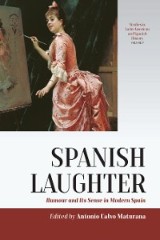Details

Spanish Laughter
Humor and Its Sense in Modern SpainStudies in Latin American and Spanish History, Band 9 1. Aufl.
|
42,99 € |
|
| Verlag: | Berghahn Books |
| Format: | |
| Veröffentl.: | 10.06.2022 |
| ISBN/EAN: | 9781800735002 |
| Sprache: | englisch |
| Anzahl Seiten: | 390 |
DRM-geschütztes eBook, Sie benötigen z.B. Adobe Digital Editions und eine Adobe ID zum Lesen.
Beschreibungen
<p> Presenting a cultural and interdisciplinary study of humor in Spain from the eighteenth century to the present day, this book examines how humour entered public life, how it attained a legitimacy to communicate ‘serious’ ideas in the Enlightenment and how this set the seed for the key position that humor occupies in society today. Through a range of case studies that run from Goya’s paintings, humor, and gender representations in radio programmes during the first Franco regime, developmentalist cinema of the sixties and seventies, to the transformation of female humor in social media, the book traces the core role that the comical has played in the public sphere. The contributors to this volume represent a wide range of disciplines including gender studies, humour studies and Hispanic studies and offer international perspectives on Spanish laughter.</p>
<p> List of Illustrations</p>
<p> <a><strong>Introduction</strong></a><br> <em>Antonio Calvo Maturana</em></p>
<p> <strong>Chapter 1.</strong> When Spaniards defied gravity: humor, seriousness and identity in Eighteenth Century Spain<br> <em>Antonio Calvo Maturana</em></p>
<p> <strong>Chapter 2.</strong> Disciplinary humour in the public sphere: the rhetorics of gender satire in José Clavijo y Fajardo’s <em>El pensador</em><br> <em>Sally-Ann Kitts</em></p>
<p> <strong>Chapter 3.</strong> “<em>La vieja y la niña</em>: Women’s humour in the comedies of María Rosa Gálvez”<br> <em>Elizabeth Franklin Lewis</em><br> <br> <strong>Chapter 4.</strong> When Women are on Top. Humour, Politics and Pornography in Goya's Swings<br> <em>Javier Moscoso</em></p>
<p> <strong>Chapter 5.</strong> Goya´s <em>Caprichos</em> and Critical Humour<br> <em>Manuel Álvarez Junco</em></p>
<p> <strong>Chapter 6.</strong> Satire and anti-liberal public opinion in Cadiz during the Cortes (1811-1813)<br> <em>Gonzalo Butrón Prida</em><br> <br> <strong>Chapter 7.</strong> Humour, translation, and gender in 18th and 19th century Spain and Mexico<br> <em>Catherine Jaffe</em></p>
<p> <strong>Chapter 8.</strong> Humour in Larra´s political analysis on Absolutism (1828-1833)<br> <em>José María Ferri Coll</em></p>
<p> <strong>Chapter 9.</strong> ‘Long Live the Joke’: Political Satire and Humour through the Valencian Newspaper <em>El Mole</em> (1837)<br> <em>Alejandro Llinares Planells</em></p>
<p> <strong>Chapter 10.</strong> <em>Monochatus non est pietas</em>. Anticlerical humour and political violence, c. 1750-1840<br> <em>Gregorio Alonso</em></p>
<p> <strong>Chapter 11.</strong> Laughter, Gender and the politics of celebrity in fin-de-siècle Spain: on Emilia Pardo Bazán<br> <em>Isabel Burdiel</em></p>
<p> <strong>Chapter 12.</strong> <em>El Gran Bvfón</em>, an illustrated magazine: Humour and caricature in Spain at the beginning of the 20th century<br> <em>Miguel Ángel Gamonal Torres</em></p>
<p> <strong>Chapter 13.</strong> Artistic Parody, Political criticism and Spanish Humour (ca. 1900)<br> <em>Carlos Reyero</em></p>
<p> <strong>Chapter 14.</strong> The “Moor”, the “Russian”, and other invaders. Satirical representations of national otherness in the Spanish Civil War (1936-39)<br> <em>Xosé M. Núñez Seixas</em></p>
<p> <strong>Chapter 15.</strong> Smile for the Homeland. Humour and gender representations in radio programs during the first Franco regime (1939-1959)<br> <em>Sergio Blanco Fajardo</em></p>
<p> <strong>Chapter 16.</strong> The developmentalist cinema of the sixties and the seventies. Archetypes of gender, social change and the “paleto” and “destape” phenomena<br> <em>Dolores Ramos Palomo</em></p>
<p> <strong>Chapter 17.</strong> From classic to transgressive humour: The transformation of female humour in social media<br> <em>Natalia Meléndez Malavé</em></p>
<p> <strong>Conclusions</strong></p>
<p> <a><strong>Introduction</strong></a><br> <em>Antonio Calvo Maturana</em></p>
<p> <strong>Chapter 1.</strong> When Spaniards defied gravity: humor, seriousness and identity in Eighteenth Century Spain<br> <em>Antonio Calvo Maturana</em></p>
<p> <strong>Chapter 2.</strong> Disciplinary humour in the public sphere: the rhetorics of gender satire in José Clavijo y Fajardo’s <em>El pensador</em><br> <em>Sally-Ann Kitts</em></p>
<p> <strong>Chapter 3.</strong> “<em>La vieja y la niña</em>: Women’s humour in the comedies of María Rosa Gálvez”<br> <em>Elizabeth Franklin Lewis</em><br> <br> <strong>Chapter 4.</strong> When Women are on Top. Humour, Politics and Pornography in Goya's Swings<br> <em>Javier Moscoso</em></p>
<p> <strong>Chapter 5.</strong> Goya´s <em>Caprichos</em> and Critical Humour<br> <em>Manuel Álvarez Junco</em></p>
<p> <strong>Chapter 6.</strong> Satire and anti-liberal public opinion in Cadiz during the Cortes (1811-1813)<br> <em>Gonzalo Butrón Prida</em><br> <br> <strong>Chapter 7.</strong> Humour, translation, and gender in 18th and 19th century Spain and Mexico<br> <em>Catherine Jaffe</em></p>
<p> <strong>Chapter 8.</strong> Humour in Larra´s political analysis on Absolutism (1828-1833)<br> <em>José María Ferri Coll</em></p>
<p> <strong>Chapter 9.</strong> ‘Long Live the Joke’: Political Satire and Humour through the Valencian Newspaper <em>El Mole</em> (1837)<br> <em>Alejandro Llinares Planells</em></p>
<p> <strong>Chapter 10.</strong> <em>Monochatus non est pietas</em>. Anticlerical humour and political violence, c. 1750-1840<br> <em>Gregorio Alonso</em></p>
<p> <strong>Chapter 11.</strong> Laughter, Gender and the politics of celebrity in fin-de-siècle Spain: on Emilia Pardo Bazán<br> <em>Isabel Burdiel</em></p>
<p> <strong>Chapter 12.</strong> <em>El Gran Bvfón</em>, an illustrated magazine: Humour and caricature in Spain at the beginning of the 20th century<br> <em>Miguel Ángel Gamonal Torres</em></p>
<p> <strong>Chapter 13.</strong> Artistic Parody, Political criticism and Spanish Humour (ca. 1900)<br> <em>Carlos Reyero</em></p>
<p> <strong>Chapter 14.</strong> The “Moor”, the “Russian”, and other invaders. Satirical representations of national otherness in the Spanish Civil War (1936-39)<br> <em>Xosé M. Núñez Seixas</em></p>
<p> <strong>Chapter 15.</strong> Smile for the Homeland. Humour and gender representations in radio programs during the first Franco regime (1939-1959)<br> <em>Sergio Blanco Fajardo</em></p>
<p> <strong>Chapter 16.</strong> The developmentalist cinema of the sixties and the seventies. Archetypes of gender, social change and the “paleto” and “destape” phenomena<br> <em>Dolores Ramos Palomo</em></p>
<p> <strong>Chapter 17.</strong> From classic to transgressive humour: The transformation of female humour in social media<br> <em>Natalia Meléndez Malavé</em></p>
<p> <strong>Conclusions</strong></p>
<p> <strong>Antonio Calvo Maturana</strong> is Associate Professor of History at the University of Malaga and principal investigator of the international research team ‘Humour and Its Sense: Discourses and Images of the Laughable from the Enlightenment until Today’. His area of expertise is European Cultural History during the eighteenth and nineteenth centuries with a particular interest in Spain. He is the author of four books, among them: <em>Impostores: sombras en la España de las luces</em> (Cátedra, 2015); <em>‘Cuando manden los que obedecen’: la clase política e intelectual de la España preliberal, 1780-1808</em> (2013); <em>‘Aquel que manda las conciencias’: Iglesia y adoctrinamiento político en la Monarquía Hispánica preconstitucional, 1780-1808</em> (2012); <em>María Luisa de Parma: reina de España, esclava del mito</em> (2007, 2ª ed. Forthcoming).</p>


















